Comparative Business Ethics and Social Responsibility Essay - HC2121
VerifiedAdded on 2023/03/20
|9
|2320
|33
Essay
AI Summary
This essay provides a comprehensive analysis of comparative business ethics and social responsibility. It begins by differentiating between personal and business ethics, exploring concepts like integrity, honesty, and leadership within an organizational context. The essay then examines the role of stakeholders, including investors, management, and the public, in shaping ethical environments. It defines social responsibility as a duty towards society and the environment, highlighting the importance of corporate governance in structuring ethics. The essay further explores the impact of corporate scandals resulting from loose governance and unethical practices. Finally, it compares and contrasts various approaches to ethical decision-making, including utilitarian, rights-based, fairness, common-good, and virtue approaches, offering insights into how organizations can navigate ethical dilemmas. The essay draws on a range of academic sources to support its arguments and provides a detailed overview of the subject matter.
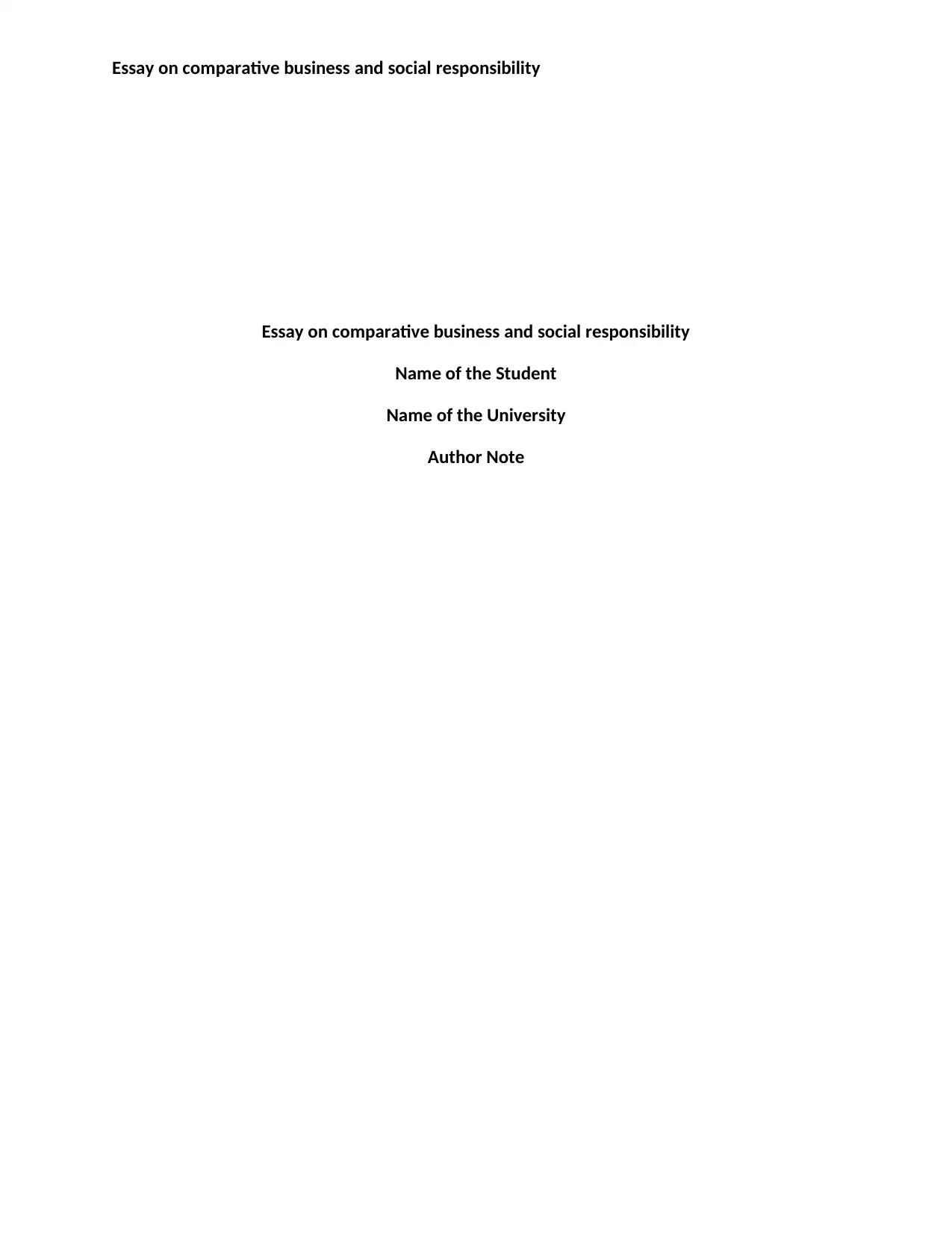
Essay on comparative business and social responsibility
Essay on comparative business and social responsibility
Name of the Student
Name of the University
Author Note
Essay on comparative business and social responsibility
Name of the Student
Name of the University
Author Note
Paraphrase This Document
Need a fresh take? Get an instant paraphrase of this document with our AI Paraphraser
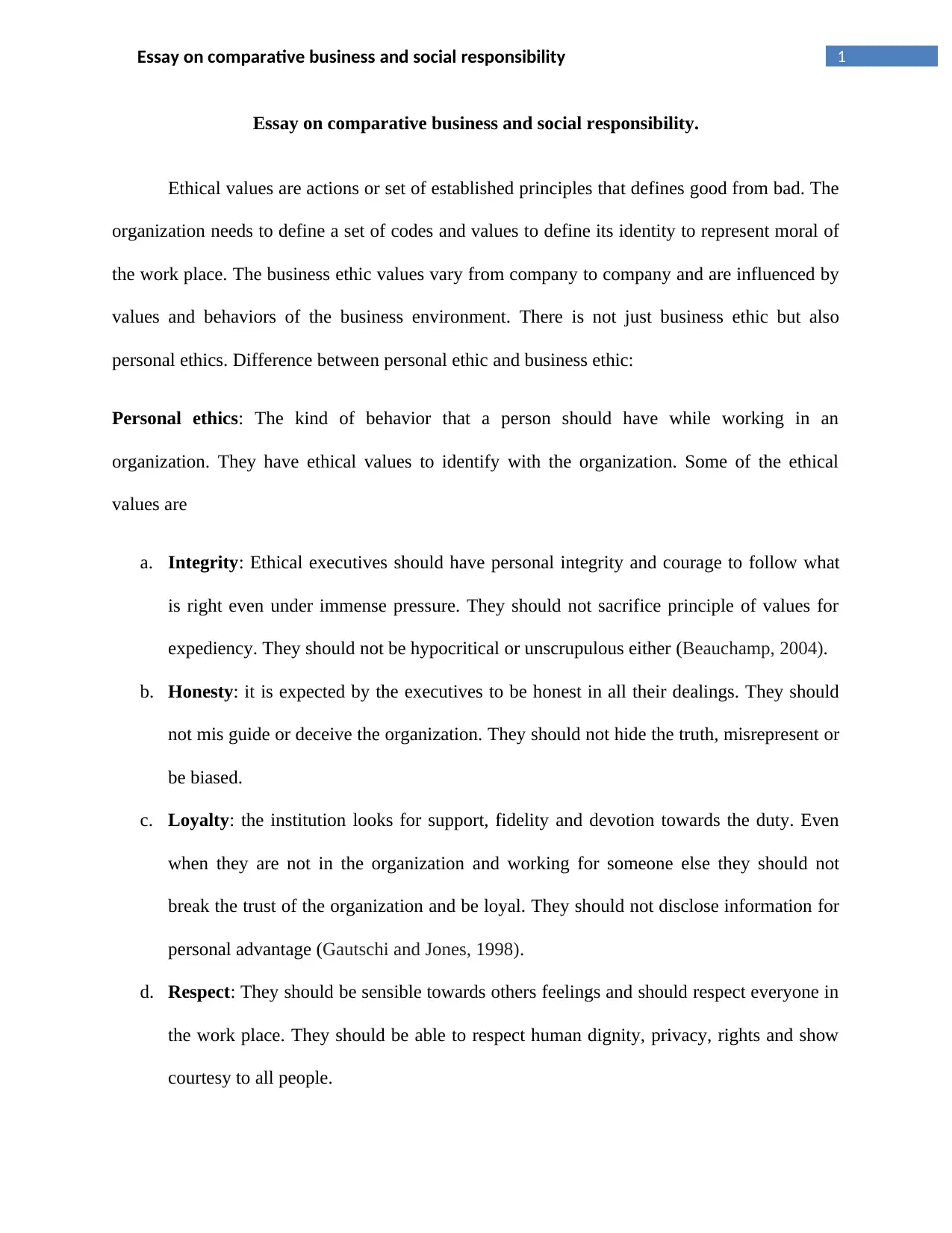
1Essay on comparative business and social responsibility
Essay on comparative business and social responsibility.
Ethical values are actions or set of established principles that defines good from bad. The
organization needs to define a set of codes and values to define its identity to represent moral of
the work place. The business ethic values vary from company to company and are influenced by
values and behaviors of the business environment. There is not just business ethic but also
personal ethics. Difference between personal ethic and business ethic:
Personal ethics: The kind of behavior that a person should have while working in an
organization. They have ethical values to identify with the organization. Some of the ethical
values are
a. Integrity: Ethical executives should have personal integrity and courage to follow what
is right even under immense pressure. They should not sacrifice principle of values for
expediency. They should not be hypocritical or unscrupulous either (Beauchamp, 2004).
b. Honesty: it is expected by the executives to be honest in all their dealings. They should
not mis guide or deceive the organization. They should not hide the truth, misrepresent or
be biased.
c. Loyalty: the institution looks for support, fidelity and devotion towards the duty. Even
when they are not in the organization and working for someone else they should not
break the trust of the organization and be loyal. They should not disclose information for
personal advantage (Gautschi and Jones, 1998).
d. Respect: They should be sensible towards others feelings and should respect everyone in
the work place. They should be able to respect human dignity, privacy, rights and show
courtesy to all people.
Essay on comparative business and social responsibility.
Ethical values are actions or set of established principles that defines good from bad. The
organization needs to define a set of codes and values to define its identity to represent moral of
the work place. The business ethic values vary from company to company and are influenced by
values and behaviors of the business environment. There is not just business ethic but also
personal ethics. Difference between personal ethic and business ethic:
Personal ethics: The kind of behavior that a person should have while working in an
organization. They have ethical values to identify with the organization. Some of the ethical
values are
a. Integrity: Ethical executives should have personal integrity and courage to follow what
is right even under immense pressure. They should not sacrifice principle of values for
expediency. They should not be hypocritical or unscrupulous either (Beauchamp, 2004).
b. Honesty: it is expected by the executives to be honest in all their dealings. They should
not mis guide or deceive the organization. They should not hide the truth, misrepresent or
be biased.
c. Loyalty: the institution looks for support, fidelity and devotion towards the duty. Even
when they are not in the organization and working for someone else they should not
break the trust of the organization and be loyal. They should not disclose information for
personal advantage (Gautschi and Jones, 1998).
d. Respect: They should be sensible towards others feelings and should respect everyone in
the work place. They should be able to respect human dignity, privacy, rights and show
courtesy to all people.
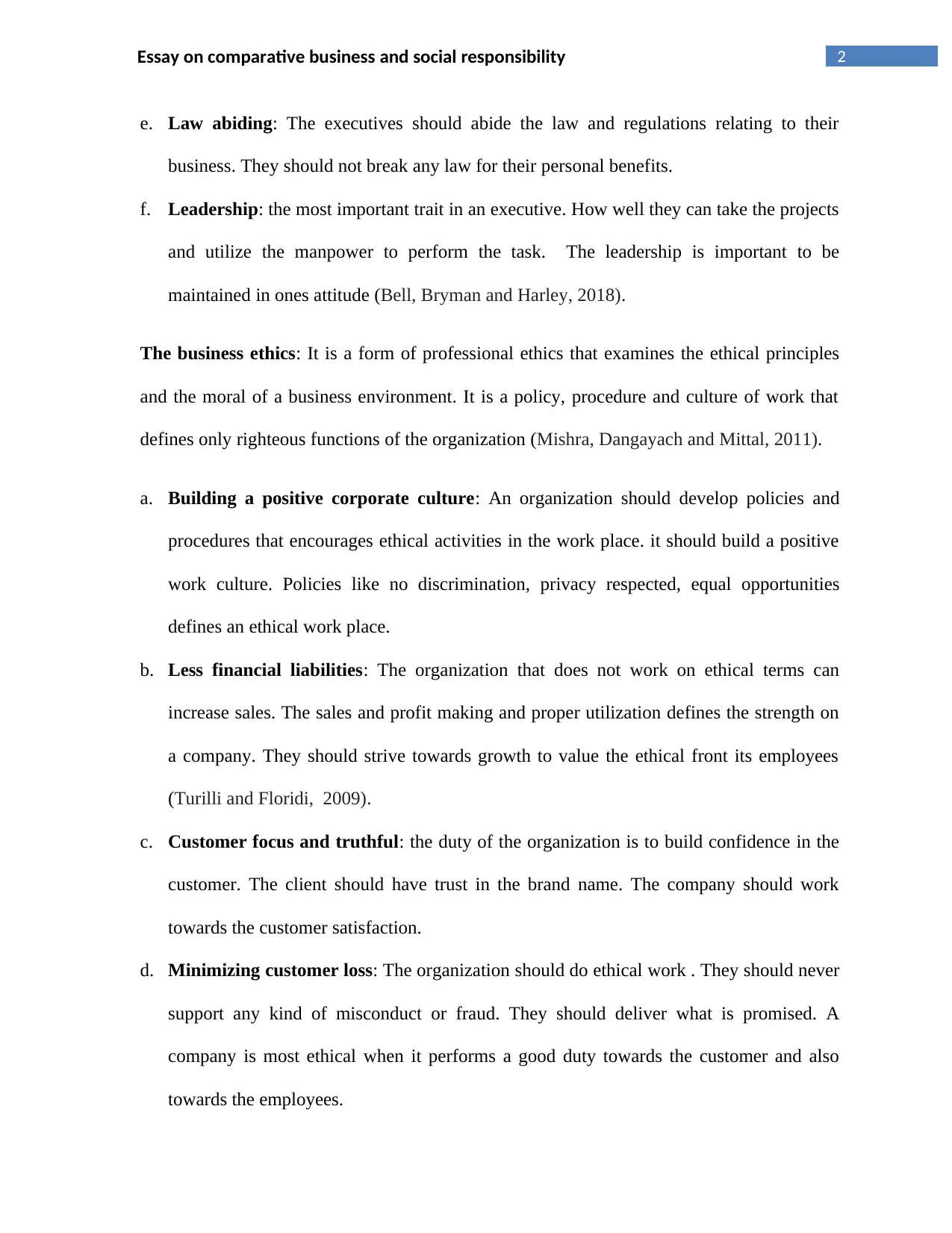
2Essay on comparative business and social responsibility
e. Law abiding: The executives should abide the law and regulations relating to their
business. They should not break any law for their personal benefits.
f. Leadership: the most important trait in an executive. How well they can take the projects
and utilize the manpower to perform the task. The leadership is important to be
maintained in ones attitude (Bell, Bryman and Harley, 2018).
The business ethics: It is a form of professional ethics that examines the ethical principles
and the moral of a business environment. It is a policy, procedure and culture of work that
defines only righteous functions of the organization (Mishra, Dangayach and Mittal, 2011).
a. Building a positive corporate culture: An organization should develop policies and
procedures that encourages ethical activities in the work place. it should build a positive
work culture. Policies like no discrimination, privacy respected, equal opportunities
defines an ethical work place.
b. Less financial liabilities: The organization that does not work on ethical terms can
increase sales. The sales and profit making and proper utilization defines the strength on
a company. They should strive towards growth to value the ethical front its employees
(Turilli and Floridi, 2009).
c. Customer focus and truthful: the duty of the organization is to build confidence in the
customer. The client should have trust in the brand name. The company should work
towards the customer satisfaction.
d. Minimizing customer loss: The organization should do ethical work . They should never
support any kind of misconduct or fraud. They should deliver what is promised. A
company is most ethical when it performs a good duty towards the customer and also
towards the employees.
e. Law abiding: The executives should abide the law and regulations relating to their
business. They should not break any law for their personal benefits.
f. Leadership: the most important trait in an executive. How well they can take the projects
and utilize the manpower to perform the task. The leadership is important to be
maintained in ones attitude (Bell, Bryman and Harley, 2018).
The business ethics: It is a form of professional ethics that examines the ethical principles
and the moral of a business environment. It is a policy, procedure and culture of work that
defines only righteous functions of the organization (Mishra, Dangayach and Mittal, 2011).
a. Building a positive corporate culture: An organization should develop policies and
procedures that encourages ethical activities in the work place. it should build a positive
work culture. Policies like no discrimination, privacy respected, equal opportunities
defines an ethical work place.
b. Less financial liabilities: The organization that does not work on ethical terms can
increase sales. The sales and profit making and proper utilization defines the strength on
a company. They should strive towards growth to value the ethical front its employees
(Turilli and Floridi, 2009).
c. Customer focus and truthful: the duty of the organization is to build confidence in the
customer. The client should have trust in the brand name. The company should work
towards the customer satisfaction.
d. Minimizing customer loss: The organization should do ethical work . They should never
support any kind of misconduct or fraud. They should deliver what is promised. A
company is most ethical when it performs a good duty towards the customer and also
towards the employees.
⊘ This is a preview!⊘
Do you want full access?
Subscribe today to unlock all pages.

Trusted by 1+ million students worldwide
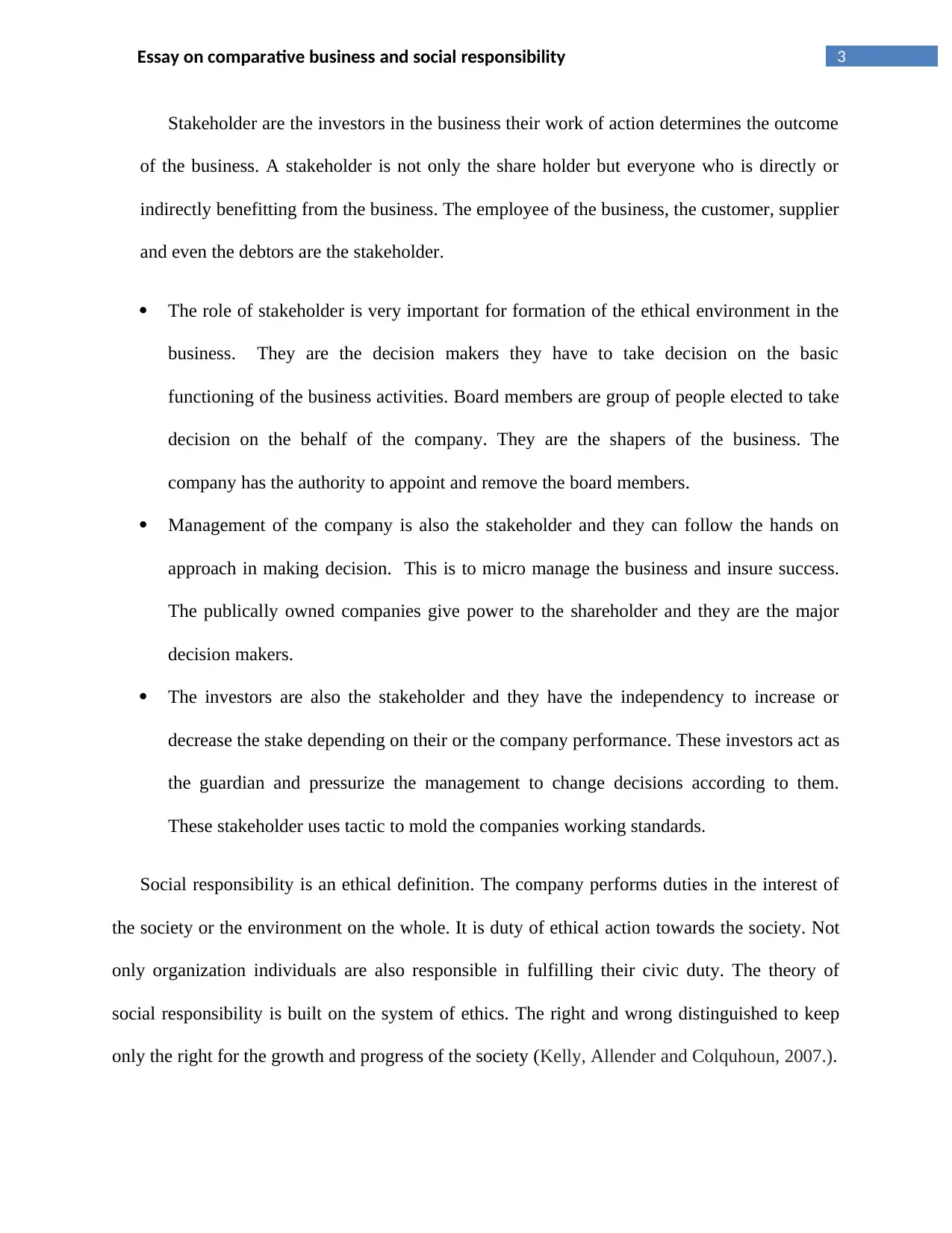
3Essay on comparative business and social responsibility
Stakeholder are the investors in the business their work of action determines the outcome
of the business. A stakeholder is not only the share holder but everyone who is directly or
indirectly benefitting from the business. The employee of the business, the customer, supplier
and even the debtors are the stakeholder.
The role of stakeholder is very important for formation of the ethical environment in the
business. They are the decision makers they have to take decision on the basic
functioning of the business activities. Board members are group of people elected to take
decision on the behalf of the company. They are the shapers of the business. The
company has the authority to appoint and remove the board members.
Management of the company is also the stakeholder and they can follow the hands on
approach in making decision. This is to micro manage the business and insure success.
The publically owned companies give power to the shareholder and they are the major
decision makers.
The investors are also the stakeholder and they have the independency to increase or
decrease the stake depending on their or the company performance. These investors act as
the guardian and pressurize the management to change decisions according to them.
These stakeholder uses tactic to mold the companies working standards.
Social responsibility is an ethical definition. The company performs duties in the interest of
the society or the environment on the whole. It is duty of ethical action towards the society. Not
only organization individuals are also responsible in fulfilling their civic duty. The theory of
social responsibility is built on the system of ethics. The right and wrong distinguished to keep
only the right for the growth and progress of the society (Kelly, Allender and Colquhoun, 2007.).
Stakeholder are the investors in the business their work of action determines the outcome
of the business. A stakeholder is not only the share holder but everyone who is directly or
indirectly benefitting from the business. The employee of the business, the customer, supplier
and even the debtors are the stakeholder.
The role of stakeholder is very important for formation of the ethical environment in the
business. They are the decision makers they have to take decision on the basic
functioning of the business activities. Board members are group of people elected to take
decision on the behalf of the company. They are the shapers of the business. The
company has the authority to appoint and remove the board members.
Management of the company is also the stakeholder and they can follow the hands on
approach in making decision. This is to micro manage the business and insure success.
The publically owned companies give power to the shareholder and they are the major
decision makers.
The investors are also the stakeholder and they have the independency to increase or
decrease the stake depending on their or the company performance. These investors act as
the guardian and pressurize the management to change decisions according to them.
These stakeholder uses tactic to mold the companies working standards.
Social responsibility is an ethical definition. The company performs duties in the interest of
the society or the environment on the whole. It is duty of ethical action towards the society. Not
only organization individuals are also responsible in fulfilling their civic duty. The theory of
social responsibility is built on the system of ethics. The right and wrong distinguished to keep
only the right for the growth and progress of the society (Kelly, Allender and Colquhoun, 2007.).
Paraphrase This Document
Need a fresh take? Get an instant paraphrase of this document with our AI Paraphraser
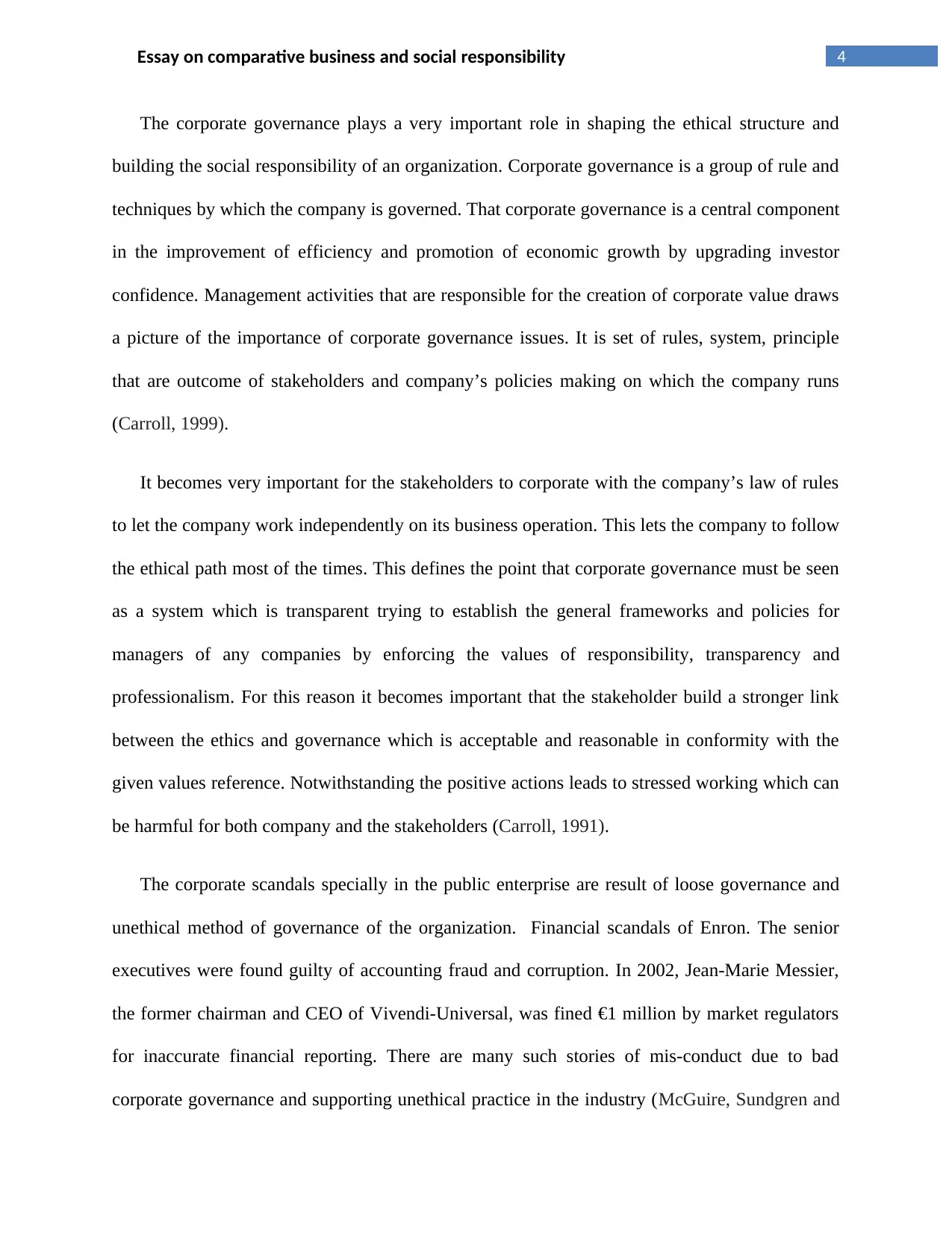
4Essay on comparative business and social responsibility
The corporate governance plays a very important role in shaping the ethical structure and
building the social responsibility of an organization. Corporate governance is a group of rule and
techniques by which the company is governed. That corporate governance is a central component
in the improvement of efficiency and promotion of economic growth by upgrading investor
confidence. Management activities that are responsible for the creation of corporate value draws
a picture of the importance of corporate governance issues. It is set of rules, system, principle
that are outcome of stakeholders and company’s policies making on which the company runs
(Carroll, 1999).
It becomes very important for the stakeholders to corporate with the company’s law of rules
to let the company work independently on its business operation. This lets the company to follow
the ethical path most of the times. This defines the point that corporate governance must be seen
as a system which is transparent trying to establish the general frameworks and policies for
managers of any companies by enforcing the values of responsibility, transparency and
professionalism. For this reason it becomes important that the stakeholder build a stronger link
between the ethics and governance which is acceptable and reasonable in conformity with the
given values reference. Notwithstanding the positive actions leads to stressed working which can
be harmful for both company and the stakeholders (Carroll, 1991).
The corporate scandals specially in the public enterprise are result of loose governance and
unethical method of governance of the organization. Financial scandals of Enron. The senior
executives were found guilty of accounting fraud and corruption. In 2002, Jean-Marie Messier,
the former chairman and CEO of Vivendi-Universal, was fined €1 million by market regulators
for inaccurate financial reporting. There are many such stories of mis-conduct due to bad
corporate governance and supporting unethical practice in the industry (McGuire, Sundgren and
The corporate governance plays a very important role in shaping the ethical structure and
building the social responsibility of an organization. Corporate governance is a group of rule and
techniques by which the company is governed. That corporate governance is a central component
in the improvement of efficiency and promotion of economic growth by upgrading investor
confidence. Management activities that are responsible for the creation of corporate value draws
a picture of the importance of corporate governance issues. It is set of rules, system, principle
that are outcome of stakeholders and company’s policies making on which the company runs
(Carroll, 1999).
It becomes very important for the stakeholders to corporate with the company’s law of rules
to let the company work independently on its business operation. This lets the company to follow
the ethical path most of the times. This defines the point that corporate governance must be seen
as a system which is transparent trying to establish the general frameworks and policies for
managers of any companies by enforcing the values of responsibility, transparency and
professionalism. For this reason it becomes important that the stakeholder build a stronger link
between the ethics and governance which is acceptable and reasonable in conformity with the
given values reference. Notwithstanding the positive actions leads to stressed working which can
be harmful for both company and the stakeholders (Carroll, 1991).
The corporate scandals specially in the public enterprise are result of loose governance and
unethical method of governance of the organization. Financial scandals of Enron. The senior
executives were found guilty of accounting fraud and corruption. In 2002, Jean-Marie Messier,
the former chairman and CEO of Vivendi-Universal, was fined €1 million by market regulators
for inaccurate financial reporting. There are many such stories of mis-conduct due to bad
corporate governance and supporting unethical practice in the industry (McGuire, Sundgren and
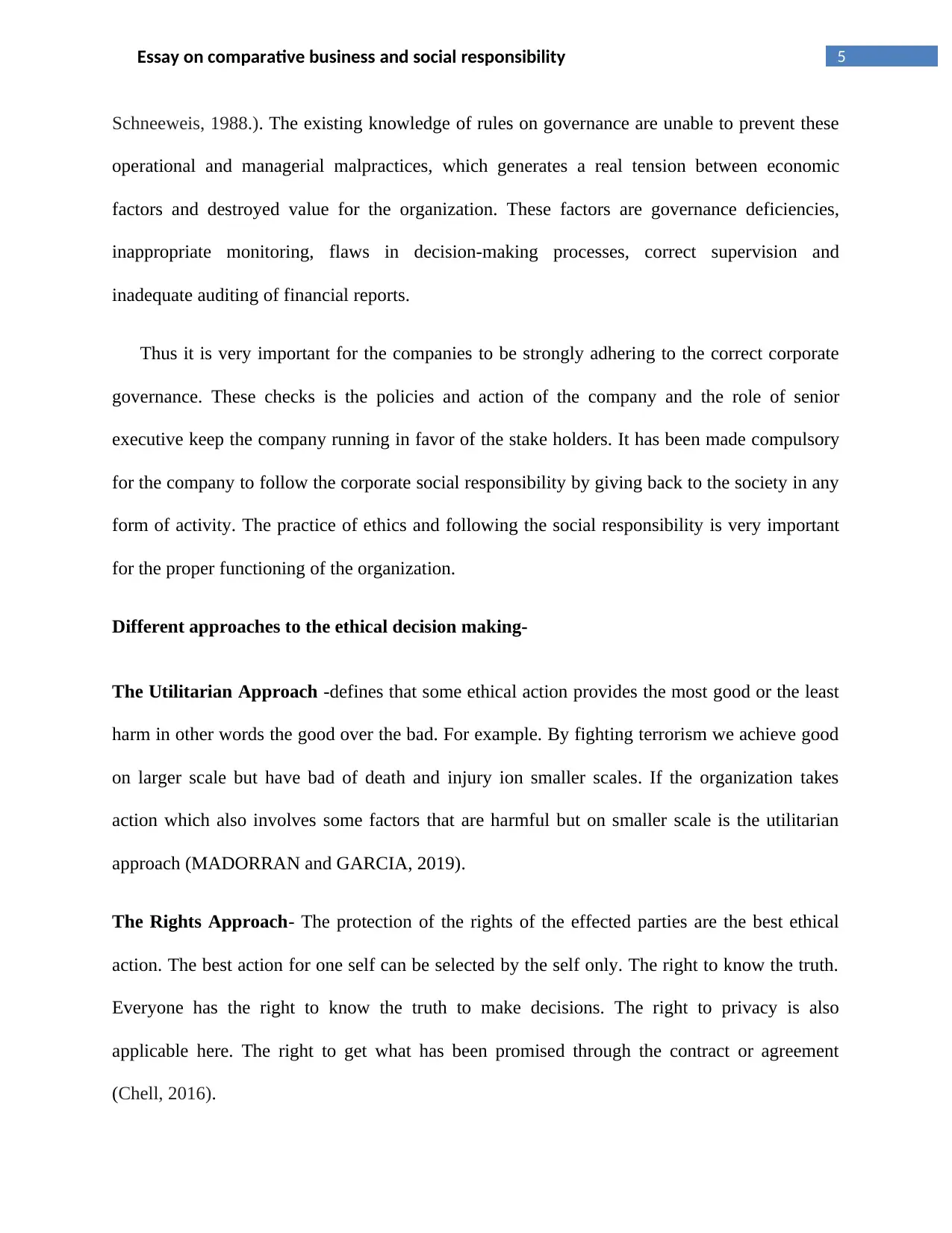
5Essay on comparative business and social responsibility
Schneeweis, 1988.). The existing knowledge of rules on governance are unable to prevent these
operational and managerial malpractices, which generates a real tension between economic
factors and destroyed value for the organization. These factors are governance deficiencies,
inappropriate monitoring, flaws in decision-making processes, correct supervision and
inadequate auditing of financial reports.
Thus it is very important for the companies to be strongly adhering to the correct corporate
governance. These checks is the policies and action of the company and the role of senior
executive keep the company running in favor of the stake holders. It has been made compulsory
for the company to follow the corporate social responsibility by giving back to the society in any
form of activity. The practice of ethics and following the social responsibility is very important
for the proper functioning of the organization.
Different approaches to the ethical decision making-
The Utilitarian Approach -defines that some ethical action provides the most good or the least
harm in other words the good over the bad. For example. By fighting terrorism we achieve good
on larger scale but have bad of death and injury ion smaller scales. If the organization takes
action which also involves some factors that are harmful but on smaller scale is the utilitarian
approach (MADORRAN and GARCIA, 2019).
The Rights Approach- The protection of the rights of the effected parties are the best ethical
action. The best action for one self can be selected by the self only. The right to know the truth.
Everyone has the right to know the truth to make decisions. The right to privacy is also
applicable here. The right to get what has been promised through the contract or agreement
(Chell, 2016).
Schneeweis, 1988.). The existing knowledge of rules on governance are unable to prevent these
operational and managerial malpractices, which generates a real tension between economic
factors and destroyed value for the organization. These factors are governance deficiencies,
inappropriate monitoring, flaws in decision-making processes, correct supervision and
inadequate auditing of financial reports.
Thus it is very important for the companies to be strongly adhering to the correct corporate
governance. These checks is the policies and action of the company and the role of senior
executive keep the company running in favor of the stake holders. It has been made compulsory
for the company to follow the corporate social responsibility by giving back to the society in any
form of activity. The practice of ethics and following the social responsibility is very important
for the proper functioning of the organization.
Different approaches to the ethical decision making-
The Utilitarian Approach -defines that some ethical action provides the most good or the least
harm in other words the good over the bad. For example. By fighting terrorism we achieve good
on larger scale but have bad of death and injury ion smaller scales. If the organization takes
action which also involves some factors that are harmful but on smaller scale is the utilitarian
approach (MADORRAN and GARCIA, 2019).
The Rights Approach- The protection of the rights of the effected parties are the best ethical
action. The best action for one self can be selected by the self only. The right to know the truth.
Everyone has the right to know the truth to make decisions. The right to privacy is also
applicable here. The right to get what has been promised through the contract or agreement
(Chell, 2016).
⊘ This is a preview!⊘
Do you want full access?
Subscribe today to unlock all pages.

Trusted by 1+ million students worldwide
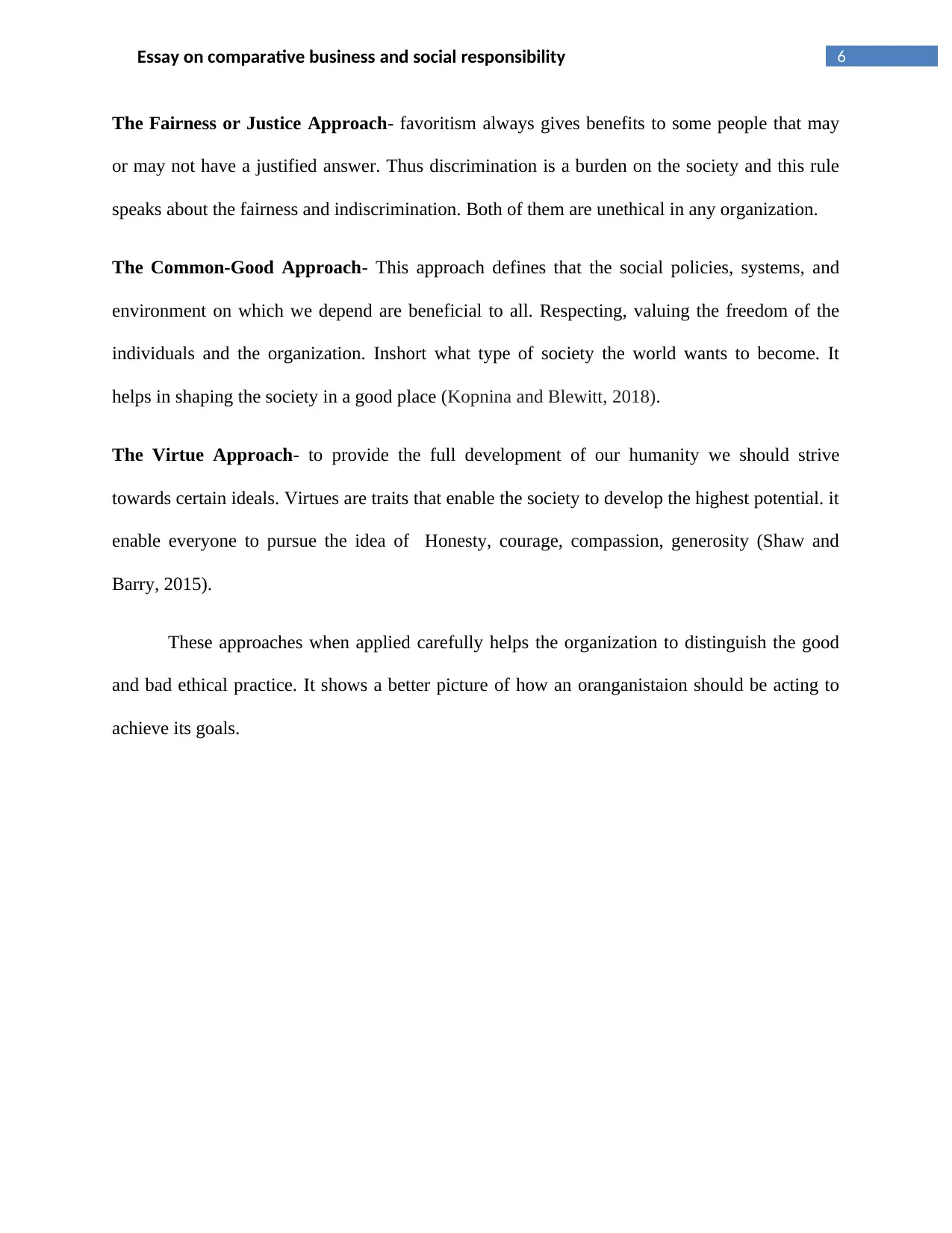
6Essay on comparative business and social responsibility
The Fairness or Justice Approach- favoritism always gives benefits to some people that may
or may not have a justified answer. Thus discrimination is a burden on the society and this rule
speaks about the fairness and indiscrimination. Both of them are unethical in any organization.
The Common-Good Approach- This approach defines that the social policies, systems, and
environment on which we depend are beneficial to all. Respecting, valuing the freedom of the
individuals and the organization. Inshort what type of society the world wants to become. It
helps in shaping the society in a good place (Kopnina and Blewitt, 2018).
The Virtue Approach- to provide the full development of our humanity we should strive
towards certain ideals. Virtues are traits that enable the society to develop the highest potential. it
enable everyone to pursue the idea of Honesty, courage, compassion, generosity (Shaw and
Barry, 2015).
These approaches when applied carefully helps the organization to distinguish the good
and bad ethical practice. It shows a better picture of how an oranganistaion should be acting to
achieve its goals.
The Fairness or Justice Approach- favoritism always gives benefits to some people that may
or may not have a justified answer. Thus discrimination is a burden on the society and this rule
speaks about the fairness and indiscrimination. Both of them are unethical in any organization.
The Common-Good Approach- This approach defines that the social policies, systems, and
environment on which we depend are beneficial to all. Respecting, valuing the freedom of the
individuals and the organization. Inshort what type of society the world wants to become. It
helps in shaping the society in a good place (Kopnina and Blewitt, 2018).
The Virtue Approach- to provide the full development of our humanity we should strive
towards certain ideals. Virtues are traits that enable the society to develop the highest potential. it
enable everyone to pursue the idea of Honesty, courage, compassion, generosity (Shaw and
Barry, 2015).
These approaches when applied carefully helps the organization to distinguish the good
and bad ethical practice. It shows a better picture of how an oranganistaion should be acting to
achieve its goals.
Paraphrase This Document
Need a fresh take? Get an instant paraphrase of this document with our AI Paraphraser
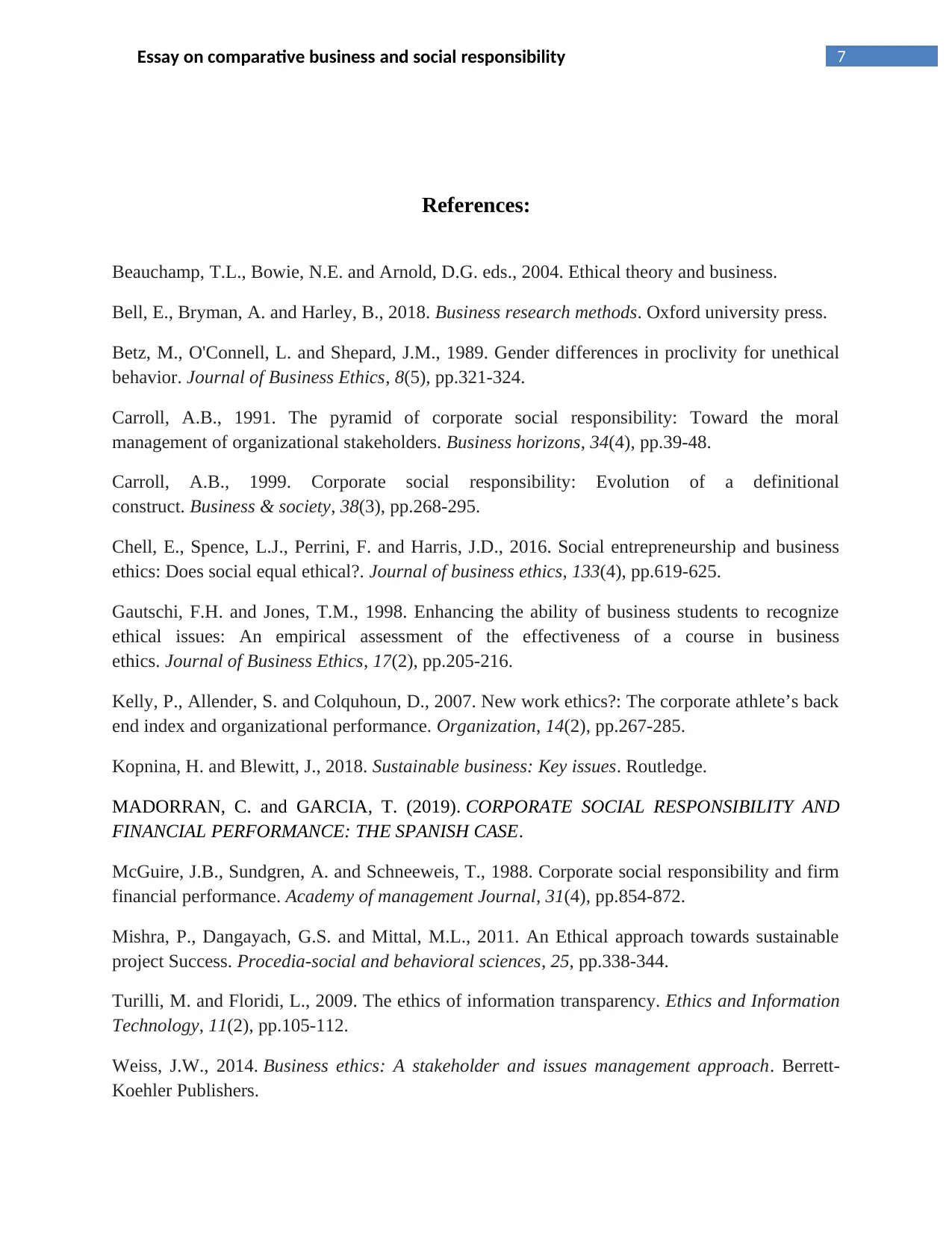
7Essay on comparative business and social responsibility
References:
Beauchamp, T.L., Bowie, N.E. and Arnold, D.G. eds., 2004. Ethical theory and business.
Bell, E., Bryman, A. and Harley, B., 2018. Business research methods. Oxford university press.
Betz, M., O'Connell, L. and Shepard, J.M., 1989. Gender differences in proclivity for unethical
behavior. Journal of Business Ethics, 8(5), pp.321-324.
Carroll, A.B., 1991. The pyramid of corporate social responsibility: Toward the moral
management of organizational stakeholders. Business horizons, 34(4), pp.39-48.
Carroll, A.B., 1999. Corporate social responsibility: Evolution of a definitional
construct. Business & society, 38(3), pp.268-295.
Chell, E., Spence, L.J., Perrini, F. and Harris, J.D., 2016. Social entrepreneurship and business
ethics: Does social equal ethical?. Journal of business ethics, 133(4), pp.619-625.
Gautschi, F.H. and Jones, T.M., 1998. Enhancing the ability of business students to recognize
ethical issues: An empirical assessment of the effectiveness of a course in business
ethics. Journal of Business Ethics, 17(2), pp.205-216.
Kelly, P., Allender, S. and Colquhoun, D., 2007. New work ethics?: The corporate athlete’s back
end index and organizational performance. Organization, 14(2), pp.267-285.
Kopnina, H. and Blewitt, J., 2018. Sustainable business: Key issues. Routledge.
MADORRAN, C. and GARCIA, T. (2019). CORPORATE SOCIAL RESPONSIBILITY AND
FINANCIAL PERFORMANCE: THE SPANISH CASE.
McGuire, J.B., Sundgren, A. and Schneeweis, T., 1988. Corporate social responsibility and firm
financial performance. Academy of management Journal, 31(4), pp.854-872.
Mishra, P., Dangayach, G.S. and Mittal, M.L., 2011. An Ethical approach towards sustainable
project Success. Procedia-social and behavioral sciences, 25, pp.338-344.
Turilli, M. and Floridi, L., 2009. The ethics of information transparency. Ethics and Information
Technology, 11(2), pp.105-112.
Weiss, J.W., 2014. Business ethics: A stakeholder and issues management approach. Berrett-
Koehler Publishers.
References:
Beauchamp, T.L., Bowie, N.E. and Arnold, D.G. eds., 2004. Ethical theory and business.
Bell, E., Bryman, A. and Harley, B., 2018. Business research methods. Oxford university press.
Betz, M., O'Connell, L. and Shepard, J.M., 1989. Gender differences in proclivity for unethical
behavior. Journal of Business Ethics, 8(5), pp.321-324.
Carroll, A.B., 1991. The pyramid of corporate social responsibility: Toward the moral
management of organizational stakeholders. Business horizons, 34(4), pp.39-48.
Carroll, A.B., 1999. Corporate social responsibility: Evolution of a definitional
construct. Business & society, 38(3), pp.268-295.
Chell, E., Spence, L.J., Perrini, F. and Harris, J.D., 2016. Social entrepreneurship and business
ethics: Does social equal ethical?. Journal of business ethics, 133(4), pp.619-625.
Gautschi, F.H. and Jones, T.M., 1998. Enhancing the ability of business students to recognize
ethical issues: An empirical assessment of the effectiveness of a course in business
ethics. Journal of Business Ethics, 17(2), pp.205-216.
Kelly, P., Allender, S. and Colquhoun, D., 2007. New work ethics?: The corporate athlete’s back
end index and organizational performance. Organization, 14(2), pp.267-285.
Kopnina, H. and Blewitt, J., 2018. Sustainable business: Key issues. Routledge.
MADORRAN, C. and GARCIA, T. (2019). CORPORATE SOCIAL RESPONSIBILITY AND
FINANCIAL PERFORMANCE: THE SPANISH CASE.
McGuire, J.B., Sundgren, A. and Schneeweis, T., 1988. Corporate social responsibility and firm
financial performance. Academy of management Journal, 31(4), pp.854-872.
Mishra, P., Dangayach, G.S. and Mittal, M.L., 2011. An Ethical approach towards sustainable
project Success. Procedia-social and behavioral sciences, 25, pp.338-344.
Turilli, M. and Floridi, L., 2009. The ethics of information transparency. Ethics and Information
Technology, 11(2), pp.105-112.
Weiss, J.W., 2014. Business ethics: A stakeholder and issues management approach. Berrett-
Koehler Publishers.

8Essay on comparative business and social responsibility
Shaw, W.H. and Barry, V., 2015. Moral issues in business. Cengage Learning.
Shaw, W.H. and Barry, V., 2015. Moral issues in business. Cengage Learning.
⊘ This is a preview!⊘
Do you want full access?
Subscribe today to unlock all pages.

Trusted by 1+ million students worldwide
1 out of 9
Related Documents
Your All-in-One AI-Powered Toolkit for Academic Success.
+13062052269
info@desklib.com
Available 24*7 on WhatsApp / Email
![[object Object]](/_next/static/media/star-bottom.7253800d.svg)
Unlock your academic potential
Copyright © 2020–2026 A2Z Services. All Rights Reserved. Developed and managed by ZUCOL.




